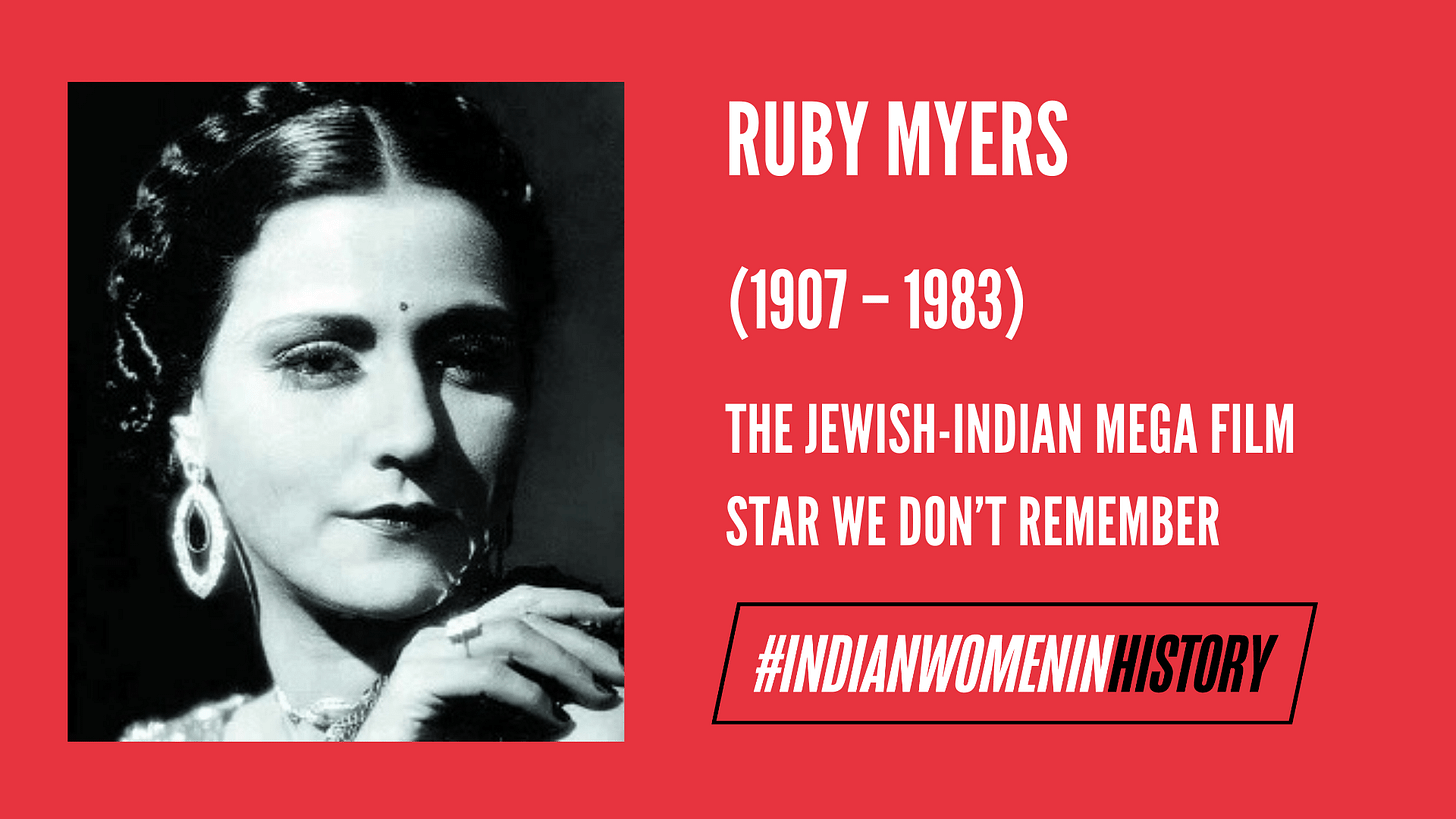Jew Ho! The Jewish Bollywood Drop
Meet Ruby Myers, the OG Bollywood queen before Bollywood was even a thing!
Today is International Women’s Day, so this week’s Drop is dedicated to the 19 female hostages that are still held in captivity by Hamas in Gaza. It’s been 150+ days. We haven’t forgotten you.
Aaaand March is Women’s History Month. This month is dedicated to celebrating the contributions of women in U.S. history, but here at The Shabbat Drop, we bend the rules to make it about… well, whatever I want to write about. This includes Jewish holidays, Jewish books, Jewish ideas, and the best of what Judaism has to offer: Jewish women. But I’m not biased.
That’s why throughout most of March, I’m going to highlight Jewish women in history who have made an impact on society, challenged norms, shook things up, and inspired many while wearing their Judaism on their sleeve.
Our first Jewish woman was Bollywood’s leading lady, Ruby Myers, otherwise known as Sulochana.
Ruby was once the biggest Indian silent film star. The Angelina Jolie of Bollywood was also a Baghdadi Jew! Baghdadi Jews descend from Iraq and elsewhere in the Middle East, often fleeing from persecution from Muslim Turkish rulers of Baghdad. Some ended up in India in the 18th century via the spice trade and made a name for themselves, like the Sassoon and the Kadoorie families, which I wrote about a little here. Today, there are a couple hundred of them left in India, most having emigrated to Israel.
Born in 1907 in Pune, Western India, Ruby was discovered by a film scout while working as a telephone operator. She initially turned down his offer to work in film, but finally agreed, launching her lifelong career on screen.
The 20s saw the golden age of silent film. Ruby’s biggest were Typist Girl (1926), Balidaan (1927) and Wildcat of Bombay (1927). This is when she rebranded herself Sulochana, Sanskrit for "the one with beautiful eyes.” (What’s Hebrew for “the Jewish blogger with influential prose?”)
The 30s saw the arrival of movies with sound. Many silent film stars saw a lull in their career during this time, since Indian talkies required actors to be proficient in Hindustani. While many actors stuck to silent films, Ruby impressed everyone by taking a year off to learn the language, and she made a comeback with the talkie version of Madhuri (1932). She also opened her own studio called Rubi Pics.
Later in her career, she faced hurdles due to the industry’s patriarchal outlook on older actresses, and it became challenging for one of Bollywood’s biggest stars to find work.
She also faced backlash with her 1947 film, Jugnu, which was banned because it showed the "morally reprehensible" romance between an old professor and the beautifully-eyed Ruby. Yikes, I’d hate to see what the industry thought of my parents’ relationship back then!
In 1973, she received the Dada Saheb Phalke Award, the highest honor that can be bestowed upon an individual in Indian cinema, for her valuable contributions. She has also been portrayed in a documentary titled Shalom Bollywood (2017) that attempts to showcase the immense cultural contributions made by the Jewish Indian community to the entertainment industry. She died in Mumbai in 1983.
Throughout her career, she’s played a gardener, a policeman, a Hyderabadi gentleman, a street urchin, a banana seller, and a European blonde. She’s been in 72 movies, and was the highest-paid actress of India’s silent film era, even more so than Bombay’s governor at the time.
She wasn’t the only Jewish Bollywood star at the time. Others included cousins Miss Rose (Rose Ezra) and Pramila (Esther Victoria Abraham, who was also the first post-independence Miss India), and Nadira (Florence Ezekiel Nadira). Can I get a Jew Ho?
Shabbat Shalom! May you honor and celebrate a talented woman in your life,





We have in our country many interesting and great women actors so it is great to discover through your Drop that there are also women actors in India. What I love about your Drop is that I learn new things each time I read your work, and that it is clear that you have found and use use your own voice, making your work distinctly yours.
Jew ho! Love that! Punderdome has certainly propelled your propensity and pure personification of the pun. I tune into the Alliteration Station and am satisfied with the sweet sounds of the silly S as it sweeps over my slippery tongue. But I digress. Fascinating - never heard of her - like the Ruby Keeler of India. This week I celebrate you as a talented woman because that’s what a Ma does! P S - was the professor in the film “old” or simply older or much older? When I met your dad he not old in the sense of an elder or ancient (long gray beard hunched over a cane) he wasn’t even mature, he was just older. Now he’s old hahaha. Love u